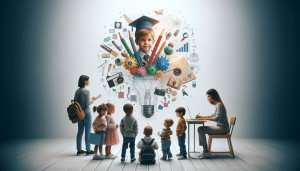You Might Be Surprised by the Power of Lifelong Learning
Oliver Cooper October 17, 2025
Discover how lifelong learning shapes opportunity, fosters personal growth, and brings unexpected benefits to individuals and communities. This guide explores the vital role of continuous education, local community resources, and how lifelong learning impacts your social connections and career chances.
Exploring Lifelong Learning and Its Surprising Reach
Lifelong learning is the continuous and voluntary pursuit of knowledge, whether for personal satisfaction or to gain new professional skills. Unlike traditional education that often ends with school or university, lifelong learning recognizes that intellectual growth can occur at any stage of life. This approach opens doors to personal enrichment, career flexibility, and better societal engagement for people of all backgrounds. Many adults embrace non-formal learning settings like workshops, online courses, and community programs to nurture their curiosity and remain relevant in evolving job markets. Interestingly, this journey of ongoing education is not limited to textbooks or classrooms; it happens at work, in libraries, through community events, and even casual conversations among peers.
The concept of lifelong learning has gained attention as technology reshapes how knowledge is created and consumed. Access to the internet and digital tools means that people can participate in online learning communities from their homes. These learners explore professional certifications, hobbies, and even language exchange—all of which can positively influence employment prospects and social mobility. For instance, digital literacy workshops in public libraries or local community centers are helping bridge the technology gap for various age groups. This trend has significant implications for reducing educational inequity and encouraging adaptive thinking skills, which are crucial for navigating rapid economic and social changes.
Far beyond career benefits, lifelong learning also impacts overall well-being and cognitive health in later years. Regular intellectual engagement, whether through formal courses or casual reading, helps improve memory, problem-solving abilities, and social interaction. Communities with active learning programs often notice increased civic participation, with residents collaborating to address common challenges. Individuals who embrace lifelong learning are also more likely to adapt to life transitions, such as retirement or career changes, because they maintain a curious and open mindset. In this way, a dedication to ongoing education can ripple outward, improving not only individual lives but also strengthening whole communities.
How Community Learning Resources Multiply Opportunities
Public libraries, community centers, and adult education providers serve as key gateways to lifelong learning. These resources often offer free or low-cost classes in digital skills, language learning, financial literacy, and more. Especially in areas where formal education may be less accessible, community-driven initiatives fill an essential gap. For example, after-work literacy classes can empower adults who missed out on education earlier in life, while makerspaces provide hands-on STEM experiences for every age. By removing economic and social barriers, these resources allow people to strengthen their skills and connect with others in meaningful ways. Ultimately, this creates a culture of shared learning and collective advancement, making education accessible in every neighborhood.
Local partnerships between schools, nonprofits, and government agencies extend the reach of community learning resources. These alliances often bring targeted programs to underserved populations, such as immigrants, job seekers, and seniors. For instance, language immersion programs at community centers help newcomers integrate into local society, find employment, and access civic services. Similarly, job readiness workshops build critical soft skills like resume writing and interview techniques. The collaborative nature of these initiatives fosters not just knowledge, but confidence and social networks that support lifelong success. The impact often spills over into families, as participants introduce new habits and learning opportunities at home.
In recent years, digital platforms have allowed community learning resources to become more accessible than ever before. Online forums, educational videos, and virtual workshops now supplement in-person classes, reaching learners who cannot attend physically due to distance, disability, or schedule constraints. Communities that embrace blended formats are seeing higher engagement levels, since learners can personalize their educational experiences. This digital inclusion is especially important for developing digital literacy, a skill considered foundational in today’s job market. By leveraging both traditional and emerging educational models, community learning resources continue to adapt, proving vital to citizens of all ages and backgrounds.
Lifelong Learning’s Unexpected Impact on Career Prospects
Ongoing education doesn’t just inspire curiosity—it can also be a hidden driver of career resilience. In competitive job markets, employers often value candidates with a proven ability to learn on the go, adapt to change, and acquire new technical abilities. This is where short courses, online certifications, or even informal learning come into play. Someone who periodically upgrades their knowledge or explores new fields is often better positioned for promotions and lateral moves. It’s not only about formal degrees; even micro-credentials and hands-on workshops can demonstrate a proactive attitude and keep professionals relevant in their chosen industries.
The rise of the gig economy and remote work options has further amplified the importance of flexible learning pathways. Workers can now pick up targeted skills, such as coding, project management, or digital marketing, through online platforms. These learning experiences are usually more affordable and adjustable to individual schedules, making career pivots less daunting. By continually investing in their skills, adults improve job security and earning prospects. For those switching industries or returning to work after a break, credentials earned through digital platforms or local programs provide tangible evidence of their commitment to growth and adaptability.
Not all advantages are immediately visible. Lifelong learners also tend to develop stronger problem-solving and communication abilities, simply because they often encounter fresh challenges or diverse peer groups through courses and workshops. These social skills and emotional intelligence are highly prized in contemporary workplaces. Employers increasingly recognize the value of soft skills, often cultivated through experiential and voluntary education. For young graduates and seasoned professionals alike, lifelong learning shapes a mindset of curiosity and initiative that stands out in any hiring process. In short, the learning journey continues to pay dividends throughout every stage of one’s career.
Personal Growth Beyond the Classroom Walls
Lifelong learning is as much about self-fulfillment as it is about practical achievement. Pursuing topics of personal interest—art, music, history, or wellness—boosts confidence and emotional well-being. Many adults turn to creative hobbies or personal development books to find joy, clarity, and a sense of accomplishment outside their work or family responsibilities. The process of learning something new can foster greater self-awareness and resilience, particularly during life’s inevitable transitions. For retirees, for instance, engaging in art workshops or gardening clubs brings purpose and structure to daily life while combating social isolation.
There’s also a fascinating feedback loop between learning and happiness. Research suggests that acquiring new knowledge or skills strengthens cognitive flexibility—the mind’s ability to shift between tasks and ideas with ease. This leads to more positive outlooks, improved mental health, and the confidence to try unfamiliar things. People who identify as lifelong learners report higher levels of life satisfaction and personal agency. They are more likely to volunteer, participate in local events, and support others, all of which feed back into stronger communal bonds and an enhanced sense of belonging. In this way, learning is not just a solo pursuit but a catalyst for collective happiness.
Even small, informal acts of learning—like reading about a new topic or practicing a language for a few minutes each day—offer meaningful benefits. The key is consistency, rather than intensity or formality. Over time, these everyday discoveries accumulate, sparking curiosity and creativity for years to come. Lifelong learning thus cultivates a growth mindset—a belief in one’s ongoing capacity for change and development—enriching personal lives far outside classroom walls. This growth, in turn, can empower individuals to overcome setbacks and find satisfaction in their unique journeys, proving there is no age limit to curiosity or achievement.
The Social Ripple Effect of Lifelong Learning
The benefits of lifelong learning aren’t confined to individuals. When groups of people engage in learning together, communities grow stronger and more connected. Community colleges, book clubs, and intergenerational mentorship programs all provide structured ways for people to interact, share skills, and pass knowledge down. These interactions help foster empathy, understanding, and respect across diverse cultures, ages, and backgrounds. A community committed to lifelong learning becomes more adaptable, with citizens better prepared to navigate social and technological changes collectively.
Family dynamics, too, can shift through education. Parents who participate in adult learning are more likely to support their children’s academic progress and encourage inquisitive habits at home. Similarly, programs that bring together elders and youth enable wisdom and new perspectives to mix, bridging generational gaps. These shared experiences gradually create a learning culture that persists across time, increasing the likelihood that everyone—regardless of age or background—can thrive. Civic participation also rises, as people feel more equipped to discuss public issues, advocate for change, and contribute solutions within their communities.
Lifelong learning encourages inclusive societies. Efforts to make educational opportunities accessible for people with disabilities, immigrants, or those facing economic hardship are particularly powerful. Universal access doesn’t only level the playing field; it also brings forward ideas and talents that might otherwise be overlooked. When learning opportunities are tailored to diverse groups’ needs, every community member has the chance to increase their skills and participate meaningfully. As more people join the learning journey, communities experience greater innovation, resilience, and a shared drive toward positive change.
Ways Individuals and Communities Can Foster Lifelong Learning
Many practical strategies can help nurture a commitment to lifelong learning. Individuals can start by setting small, manageable learning goals—reading one article per week, attending a local seminar, or joining an online course. Participating in neighborhood book clubs, local history projects, or volunteering for community education programs not only boosts knowledge but creates important social connections. By forming or joining informal study groups, adults can encourage accountability and deepen their learning experiences. The key is to see education as a living, breathing process woven into everyday life rather than a finite task.
Communities can play a pivotal role by advocating for accessible education resources, such as expanding library programs or offering free digital skills workshops. Partnerships with local businesses may bring real-world learning opportunities through internships or peer-led training events. Municipalities can further promote lifelong learning by sharing information about public courses, scholarships, or community-driven events in newsletters or social media. These efforts help raise awareness and minimize barriers—financial, technological, or social—that often limit participation, ensuring that educational opportunities remain truly inclusive.
Fostering a culture of continuous learning requires intention and collaboration at all levels. Schools, workplaces, governments, and families can reinforce the message that education does not end with a diploma or certificate; it is a lifelong adventure. By celebrating and sharing learning achievements, communities create an environment where curiosity and innovation are seen as strengths. Ultimately, the ripple effects of these small actions accumulate into a larger, collective movement—expanding possibility and resilience far beyond any single individual.
References
1. UNESCO Institute for Lifelong Learning. (n.d.). Why lifelong learning matters. Retrieved from https://uil.unesco.org/lifelonglearning
2. U.S. Department of Education. (n.d.). Advancing adult learning and education: Community-based initiatives. Retrieved from https://www2.ed.gov/about/offices/list/ovae/pi/AdultEd/index.html
3. National Academies of Sciences, Engineering, and Medicine. (2017). The value of lifelong learning for career and society. Retrieved from https://www.nap.edu/read/24624/chapter/6
4. OECD. (2021). Benefits of adult learning. Retrieved from https://www.oecd.org/education/benefits-of-adult-learning.htm
5. American Library Association. (n.d.). Public libraries and digital literacy. Retrieved from https://www.ala.org/advocacy/public-libraries-and-digital-literacy
6. National Center for Families Learning. (n.d.). Lifelong learning: Benefits and strategies. Retrieved from https://www.familieslearning.org/blog/lifelong-learning-benefits-strategies







